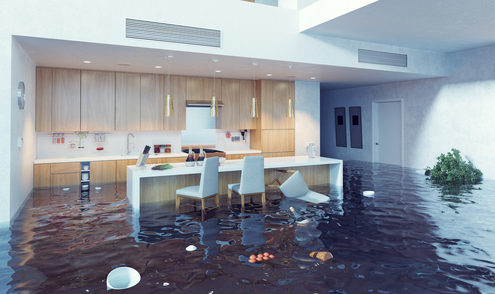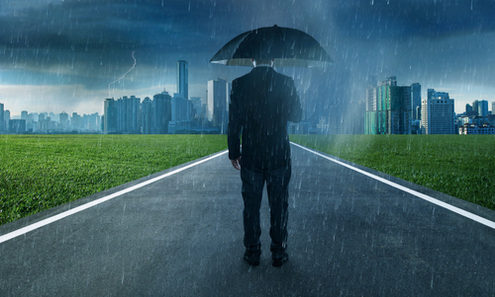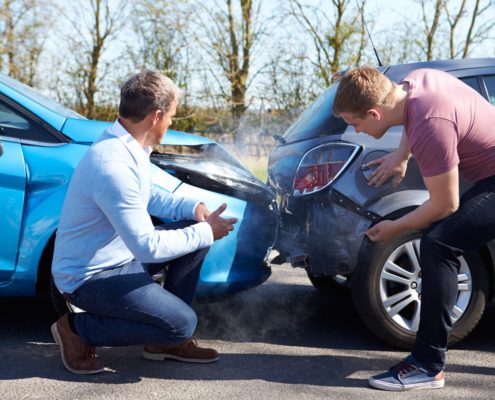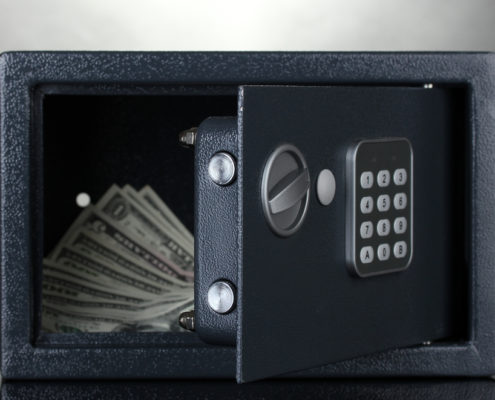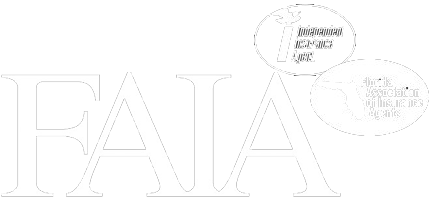Careful Driving At Night
/in Auto Insurance, Free Tips /by Synergy InsuranceIf you’re a fan of road trips, or driving at night in general, you understand the extra safety required to navigate dark roads. You might think you drive just as well at night, but consider this: Even though nighttime driving accounts for just 23% of vehicle miles traveled, more than 50% of fatalities for vehicle occupants 16 and older occur between 6 p.m. and 6 a.m., according to the National Safety Commission (NSC).
The Truth About Flood Insurance
/in Family Safety, Free Tips /by Synergy InsuranceFlooding is the #1 ranked natural disaster in the country and yet, there are numerous common misconceptions about flood insurance that permeate in the United States, specifically in Florida. Make sure your home and property is protected in case of an emergency, as many residents live in coastal areas. Knowing the importance of flood insurance is the first step in preventing unexpected loss, and we’re here to help get you ready.
My Homeowners Policy Covers Flooding
Fact: Your homeowners policy more than likely does not cover flooding. You may have optional coverage for back-up of sewers and drains, but flooding caused by natural disasters or similar events are provided by different agencies such as The National Flood Insurance Program to allow policyholders the maximum flexibility in coverage and to save them money with lower premiums.
I Don’t Live in a Flood Zone, So I Don’t Need Flood Insurance
Fact: Per the National Flood Insurance Program, flooding is a general and temporary condition where two or more acres of normally dry land or two or more properties are inundated by water or mudflow, caused by various conditions such as severe storms and sources of rapid water accumulation. Believe it or not, we all live in a flood zone, which has the potential to fill with water any time. The difference is the severity or risk of flooding in your particular zone. Industry wide, however, over 20% of all flood claims come from people who are NOT in high risk areas, and 1/3 of all disaster assistance goes to flooding victims according to FEMA – so we’re all at risk.
Flood Damage is Easy to Pay Back
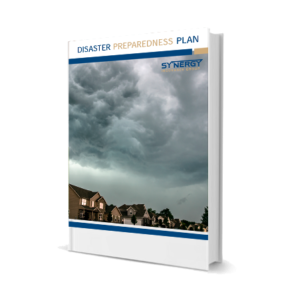
Make sure your home, family and belongings are protected in case of a disaster with our Disaster Preparedness Plan! This resource is filled with tip sheets, evacuation routes, and safety information to help give you peace of mind during the worst. Click the image to get your copy!
Why You Should Consider Hurricane Insurance For Your Business
/in Business Insurance, Free Tips /by Synergy InsuranceIt’s that time of year again: hurricane season in Florida. Although Florida is known as the “Sunshine State” for a number of reasons, this doesn’t always mean that living in Florida is a vacation. Florida is also known for severe weather, which include high winds, damaging rains, a tornado or two and probably the worst – hurricanes.
Although Florida residents and business owners know that insurance is important, it is not required, particularly for businesses. But just because commercial insurance isn’t required doesn’t mean that you shouldn’t have it.
What You Probably Don’t Know about Hurricane Insurance
Most business owners may not realize that property insurance might not include hurricane insurance. Hurricane insurance is usually an add-on that costs extra to include in their policies. The location of the business and other factors, such as the proximity to the coast all determine the cost of coverage.
In the event that a hurricane hits and causes damage to your business property, it could cost you a pretty penny. In fact, damages from a recent storm totaled over $100,000 in damaged property and equipment for one business. Could your business survive a financial hit like that?
The Difference Between Hurricane Insurance and Flood Insurance
Most business owners assume that if a hurricane results in a flood that hurricane insurance is enough to cover the damage. However, flood insurance is a separate policy all together. Like hurricane insurance, flood insurance is another add-on that costs extra.
Hurricane insurance and flood insurance for business are well worth the added costs, especially in an area that is prone to hurricanes. It is a small price to pay to recoup some of the losses from a severe storm than being forced to shut your doors for good.
How Synergy Insurance Can Help
The team at Synergy Insurance specializes in writing insurance policies for homeowners and businesses in the state of Florida. Since hurricane season is now in full swing, Synergy Insurance wants to ensure that business owners recognize why they should have insurance and understand that hurricane insurance and flood insurance are separate.
This year’s storm season is expected to be busy in the Atlantic, so the team at Synergy Insurance wants business owners to be prepared in advance. Contact our team today for questions, or click the button to get a free quote.
What Do the Florida No-Fault Rules Mean for You?
/in Auto Insurance, Free Tips /by Synergy InsuranceEarlier this spring, a bill calling for the repeal of Florida’s long-standing, no-fault auto insurance system did not pass by Senate subcommittee. Since this bill is likely to resurface for further debate, we’ve gathered some facts and information to help you feel informed the next time it appears for voting.
What Does No-Fault Even Mean?
The Florida No-Fault Motor Vehicle Law means that if you get into a car accident, both parties must submit auto insurance policies to make claims. Regardless of who is at-fault, your own auto insurer is the one to contact to help with your medical bills, lost earnings, and out-of-pocket damages.
The current minimum requirements for a Florida auto insurance policy are $10,000 personal injury protection (PIP) and $10,000 property damage liability (PDL).
Many other states require a minimum amount of bodily injury (BI) insurance; however, because of Florida’s no-fault status, BI coverage is only requested in a handful of instances (e.g. if you’ve previously caused a serious accident, or have a DUI conviction).
What Does PIP Cover?
After paying your deductible (if you have one), PIP covers 80% of your medical expenses, up to that $10,000 limit per accident. In most cases, it also pays up to 60% toward lost wages and includes a $5,000 death benefit.
Is Minimum Coverage Enough?
The minimum allows you to drive legally in the state of Florida, but it leaves you unprotected in many situations. While your PDL will pay out to another driver if you’re at-fault, it won’t help you with any damages or repairs needed to your own vehicle! Even if you weren’t at-fault, there is always the risk that the person who caused the accident may be an uninsured driver, leaving you with no assistance to repair your property.
The minimum is also not enough for most vehicle lenders. If you are financing or leasing your vehicle, your lender may require you to carry collision and comprehensive coverage for the duration of the loan/lease. If you bought your car outright, opting for a collision and comprehensive policy is still a good choice to keep it protected from damages (especially if it is a newer vehicle).
What Would Change if the Bill to Repeal the No-Fault Law is Passed?
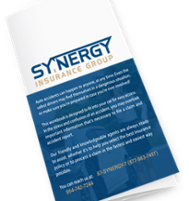
Auto insurance can be a tricky road to navigate. We encourage you to contact one of our knowledgeable and friendly agents at Synergy Insurance today to make sure you’ve got the best possible coverage to fit your needs!
Our Auto Accident Workbook is designed to help you in times of need with diagrams, safety information and more. Before getting behind the wheel, make sure you’re prepared in case of an
emergency and have this on-hand!
Why is Commercial Liability Important?
/in Business Insurance, Free Tips /by Synergy InsuranceAs a business owner, you know that commercial liability insurance covers you from your own mistakes. Whether the mistake was real or only perceived as a mistake by a customer, liability insurance helps you out when you find yourself in legal hot water. If you’ve struggled to fully grasp just what a liability policy does and does not cover, you’re not alone. Here’s an easy reference that will help you understand the importance of commercial coverage for your business.
What Does Commercial Liability Cover?
Commercial liability covers legal fees, investigatory charges, and potential settlements. It often covers bodily injury or property damage for certain types of accidents, and will even cover copyright violations.
There are plenty of risks in the business world. If an employee sues you for wrongful discrimination, or a competitor accuses you of copying their marketing strategy, you’ll want commercial coverage to help you either settle the claim or fight it in court.
What’s Not Covered with Commercial Liability?
Commercial coverage doesn’t typically include employee injuries, punitive damages, or professional mistakes. Punitive settlements refer to money given to an injured party over and above the face value of their injuries (e.g., settlements given for emotional damages).
Business owners need separate worker’s compensation insurance to cover employee injuries and professional liability to cover professional mistakes. (An example of a professional mistake would be a baker who made two cakes, German Chocolate and Chocolate Peanut Swirl, and then sent the swirl cake to the wrong person, who happened to have a severe peanut allergy.)
How Much Commercial Liability Is Enough?
A single lawsuit could cost you tens- to hundreds of thousands of dollars before it’s ever settled. Liability policies have financial limits that you must remain aware of as your business ebbs and flows.
No matter how hard you work to keep incidents to a minimum, it’s impossible to cut liability risks down to zero. Whether you work on your own or maintain a small business with more than 50 employees, it’s important you seek the counsel of a trusted insurance agent to help you decide how much commercial liability is right for you.

Essential Safety Tips for Nighttime Boating
/in Family Safety, Free Tips /by Synergy InsuranceIf you own a boat (or better yet, as the joke goes, you know someone who does), you’ve probably thought about spending some evenings on the water – especially in the summertime.
It’s a great thought, of course. But, when you’re boating after dark in Florida, you need to think about staying safe, even as you enjoy the stillness of the water and the starry sky.
Here are seven things to keep in mind, both before you hit the water and once you’re out cruising around:
-
- Have a plan – and tools to help if it goes wrong: Don’t go boating at night in an unfamiliar place. You can’t see as well, obviously, so stick to where you know the ropes, so to speak. And because things look different in the dark, make sure you have the correct navigational tools in case you get lost.
- Share your plan: Always give a friend or family member your “float plan.” Include where you’re going, your boat’s description and registration information, who’s with you and when you’ll be back.
- Check – and dress for – the weather: On top of the other difficulties of boating at night, you don’t want to get caught in a storm if you can help it. And you want to be comfortable, so be sure to bring clothing appropriate for the forecast. A sweatshirt, blanket and extra towels may come in handy, even in the summer.
- Do a pre-trip inspection: This is good advice for daytime boating as well, but at night it’s crucial that your navigation lights work, for starters. You also need a horn, plenty of fuel, a radio, a flashlight, flares, fire extinguishers and life jackets for all passengers.
- Slow down: Speed is a factor in many boating accidents, and the limited visibility at night makes the water even more dangerous. Remember, you aren’t going to be the only one on the water at night, so know the right-of-way rules.
- Pay attention. Know how to monitor the navigation lights of other vessels to recognize which direction they are going. Be particularly cautious about small vessels, such as canoes and kayaks, as well as anchored or drifting boats. Their lights can be easily confused with lights onshore.
- Don’t get distracted – or drunk: It’s never okay to drink and operate a boat, so be sure you have a designated driver. And, though you’re out there to have fun, make sure you can still hear the sounds from approaching vessels. Keep the stereo low and your ears open.
While these tips are important, there’s nothing like experience to help ensure a safe voyage. If you’re a new boater or just in an unfamiliar vessel, you may want to put in more hours during the day before tackling an area at night. Even then, start with short evening outings and work your way up to a moonlight ride. And don’t forget to turn on the lights at the dock before you go!
Contact Us!

Contact us today to speak with an agent and get a free, no-hassle quote! Our agents are available to help you find the best coverage possible.
What Should Go in Your Home Safe (or Safe-Deposit Box)?
/in Family Safety, Free Tips, Homeowners Insurance /by Synergy InsuranceSpring has arrived, which means it’s time to clean the cobwebs out of the corners, organize the closets and so forth. While you’re at it, don’t forget to revisit the important documents and other items you have in your home safe and in that safe-deposit box at the bank.
What documents do you need to keep? What can your shred? Are your valuable items properly secured?
Wait, what’s that? You don’t have a home safe? Or a safe-deposit box? Well, let’s look at why you may want to get one – or both – and what to keep inside.
Home Safes
Oftentimes these are well suited for safeguarding important documents and valuable things you access somewhat regularly, such as jewelry or watches. Keep in mind that while residential safes help protect against fire and theft, they often aren’t as robust as commercial models. For the best protection in a home safe, select a model that is heavy enough that a burglar couldn’t make off with it, and consider bolting it to the floor. Here are some of the things you may want to keep inside:
- Insurance policies and your agent’s contact information.
- Passports, original birth certificates and Social Security cards.
- Photocopies of passports, credit cards and driver’s licenses, in case they are ever lost or stolen from your purse or wallet.
- Tax documents and tax returns, from the past six to seven years.
- A list of your family’s medical information and contacts, including doctors, pharmacies and medications.
- Investment and banking documents, including billing contact information, as well as emergency cash.
- Heirloom and other valuable jewelry and watches.
- Wills and other important legal documents, including wills that list you as the executor.
- Computer backup disks or drives, or other small electronics you don’t use regularly.
- Safe-deposit box keys.
Safe-Deposit Boxes
Speaking of safe-deposit boxes, are they an old-fashioned notion or something that’s worth your while? To answer that question, U.S. News & World Report recommends gathering everything you might want to store in a safe-deposit box and then determining whether you feel secure enough storing it all at home.
If not, a safe-deposit box may be a better, more secure option. A bank is more heavily guarded than your home, after all – against theft, fire and other disasters.
If you do decide on a safe-deposit box, here’s what you might want to keep in it:
- Originals of key documents, such as property deeds, car titles, etc.
- Valuable collections or family keepsakes that you don’t access very often.
- Pictures or videos from your home inventory to use for insurance purposes.
If not, store these items in your home safe. And, here’s what NOT to put in a safe-deposit box:
- Anything you may need to access quickly, such as passports, powers of attorney documents, etc.
- Cash. Not only will your money not earn interest in a safe-deposit box, it won’t be protected by FDIC insurance, either.

After all, if something is valuable enough to lock up, isn’t it valuable enough to insure, too? Talk to us about your personal property coverage and about scheduling any high-value items, especially expensive jewelry and collectibles, separately.
Getting Your Boat Out of Storage and into the Water
/in Family Safety, Free Tips /by Synergy InsuranceSpring is here, and you’re ready to get out on the water. But is your boat ready?
Even if you’ve kept it properly stored for the winter and protected from the elements, there are still a number of things you need to do before hitting the local lakes and rivers.
While much of your focus will be on the boat itself, don’t forget other important things, such as your trailer, your vessel registration and, of course, your insurance coverage. We can help you with that. As far as the boat and trailer, check out these tips from Discover Boating, which provides boating information and public outreach on behalf of the National Marine Manufacturers Association.
Engine and Electric
Your boat’s been sitting for a few months, so it’s not ready to zip across the water just yet. Here are a few things to check before firing up the ignition:
- Make sure fuel hoses are not soft, brittle or cracked and check the system for leaks or damage. Also verify that fittings and clamps are secure.
- Check all other belts, hoses and cables as well. Replace them if needed.
- Inspect electrical connections for corrosion and verify your battery is holding a charge.
- Check all fluid levels and change or top off as needed.
- Test for proper ventilation.
Propellers and Hulls
Damage to your propeller or hull can make for an unpleasant day on the water. Here are some things to look for:
- Propellers that have dings or distortion. This can lead to not only an unpleasant ride due to vibration but can also damage your drive train. While securing your propeller, check that the bearings are not worn out.
- Hulls with blisters or cracks. Cleaning the hull (use an environmentally safe solution) gives you a good opportunity to check for damage. While you’re at in, clean above deck, too.
Trailer
You should treat your trailer with as much care as your boat. After all, you can’t go boating if you can’t get your boat to the water.
- Inspect the grease fittings on the hubs and reapply grease as needed.
- Test the lights on your trailer each time before you get out on the road.
- Rinse thoroughly after exposure to salt water.
- Ensure your car jack will work to lift the trailer and that you will be able to loosen and tighten the lug nuts. You don’t want to be surprised when you’re on the side of the road.
- Look over the trailer bunks once your boat is in the water to ensure the padding isn’t worn.
Safety Equipment
No matter how well your boat runs, you should never run it without the proper safety equipment. So take inventory of what’s on board to be sure you have:
- Enough life jackets for all potential passengers. Make sure they’re in good condition, too.
- Fire extinguisher. Be sure it’s the correct classification for your boat and is in working order.
- Emergency position-indicating radio beacon (EPIRB) so you can be found if you get lost.
- Carbon-monoxide detector if there’s an enclosed area on your boat.
- Working navigation lights.

Contact us today for a free boat insurance quote, and talk to one of our trusted agents. Hope to see you out on the water!
4 Important Driving Tips to Share with Your Teen
/in Auto Insurance, Family Safety, Free Tips /by Synergy InsuranceGetting a license to drive is a huge and thrilling milestone in a teen’s life! For parents, adding a new driver to their auto insurance policy is usually less thrilling and more anxiety-inducing. You want your teen to feel confident out on the road and you want to know they’re making smart choices, so what can you do to stress less and help them drive better?
Here are some useful tips to share with your teen to help them make safe driving choices.
Encourage healthy cellphone habits
While it is illegal to text while driving in Florida, it’s not illegal to talk on the phone. The Florida DMV does, however, urge drivers to limit phone use to emergencies and to invest in a hands-free device. They recommend knowing the features of your phone and using speed dial so the eyes stay on the road and not on the phone.
You might really want to reach your teen, but you don’t want them to risk their safety answering your, “Are you coming home for dinner?” text. Talk to them about the importance of waiting until they are parked before answering any phone or text messages. Your tech savvy teen might even already know how to set up an auto-response feature on their phone, but if not you can show them this.
Also, remind your teen to save those emotional or stressful phone conversations with friends for another time and to never talk on the phone when the weather and road conditions are hazardous.
This is not a circus. The vehicle is not a clown car
Now that your teen is reveling in his or her newfound freedom, it’s likely they’re eager to cruise around with friends and give rides to everyone they know. While they can probably fit a lot of bodies in one vehicle, overcrowding a car is a recipe for distraction. It’s also unlawful.
Remind your teen that they can legally only transport as many passengers as they have seatbelts for in their car and that limiting passengers to just one or two friends reduces distractions.
Plan and don’t rush
Nudge your new driver toward advance trip planning. Leaving even ten minutes early lets drivers reach their destination without speeding and allows for any traffic surprises. Depending on your teen’s age, there are certain times at night when they can’t be on the road. Check out this link and discuss night time curfews where applicable.
It’s important for your teen to understand they fall in the highest risk group for auto accidents.
Even a minor fender bender can send their monthly car insurance premium skyrocketing and keep it high for years to come. Let them know if they plan ahead and don’t rush, they not only reduce their risk of a car accident but also the cost of auto insurance.
Be a defensive driver not an aggressive one
We all know someone who claims they suffer from “road rage”, right? Warn your teen about potential road situations that could lead to frustration and rage. Remind your teen to never follow another vehicle too closely. If they get tailgated, they should remain calm and try to move into another lane as soon as it is safe to do so. This is a good time to also review how to properly use the car horn as a defensive tool (i.e. when another car doesn’t see you and is about to merge into your lane and hit you).
You can help your teen stay safe from predators by making sure they know to drive to the nearest police station, instead of driving home, if they ever fear they’re being followed.

Would your teen know what to do if they were involved in a car accident? Make sure they’re prepared for the worst by downloading our Auto Accident Workbook! This free guide easily folds to fit into any car compartment, meaning they’ll have it on hand if they ever need it.
Quick Links
Address
1000 Sawgrass Corporate Parkway,
Suite 450, Sunrise FL 33323
Hours of Operation
9:00AM – 5:00PM Monday – Thursday
9:00AM – 4:00PM Friday


